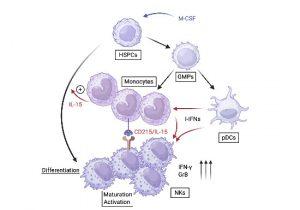In the realm of virology, some viruses can quietly coexist within a host’s body for a lifetime, causing no harm. However, they can eventually become active and cause harm when the immune system weakens. Human cytomegalovirus (CMV) is one such virus – typically benign to the general population, yet potentially life-threatening for individuals with suppressed immune systems, such as those undergoing bone marrow transplantations. The window of vulnerability arises during the initial months after transplantation when these patients find themselves defenceless. They face the risk of either contracting CMV or reactivating dormant viral reservoirs within their bodies.
Treatment options for CMV are far from ideal, often limited in efficacy and riddled with severe side effects like kidney and liver failure, deafness, and sepsis. In a new study, researchers have developed a new method to overcome this. Instead of directly targeting the virus with antiviral treatments, the researchers chose to fortify the immune system itself, equipping it to fend off the virus autonomously (Figure 1).
At the core of this strategy lies the cytokine, macrophage colony-stimulating factor (M-CSF or CSF1). This small signalling molecule acts as a messenger and activator for the immune system. M-CSF’s role is to stimulate the production of specific white blood cells, particularly monocytes and macrophages. Although traditionally monocytes and macrophages were not considered the primary defence against viruses, the researchers discovered that they play a pivotal role in activating other immune cells, particularly natural killer cells, which are vital virus fighters.
Through the administration of M-CSF, the researchers initiated the production of new white blood cells, effectively bolstering the immune system’s capacity to combat the virus. The study demonstrated that M-CSF treatment significantly increased white blood cell production in immunocompromised mice, successfully shielding them from otherwise lethal CMV infections without interfering with bone marrow transplantations.
This approach holds immense promise as a prophylactic or general intervention strategy for immunosuppressed individuals, offering renewed hope for those navigating the complexities of immune system vulnerabilities during medical procedures like bone marrow transplantation.
Journal article: Kandalla, P. K., et al., 2023. M‐CSF directs myeloid and NK cell differentiation to protect from CMV after hematopoietic cell transplantation. EMBO Molecular Medicine.
Summary by Stefan Botha











